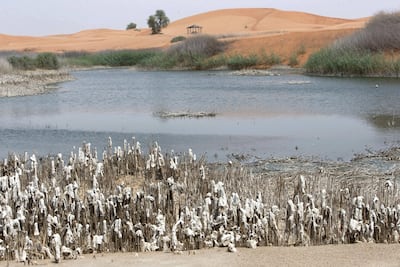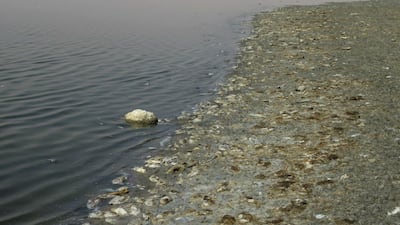Hundreds of dead fish have washed up at an artificial lake in Al Ain, prompting an expert to brand it a 'thorn in the side' of the environment.
Zakher lake, a man-made oasis surrounded by sprawling desert, has been a haven for nature lovers and home to a wide variety of birds and fish for the past decade.
The beauty spot was blighted, however, by the recent discovery of dead fish on shore.
Environment Agency Abu Dhabi said it was investigating the cause of the mass deaths at the site.
“This is a freshwater fish called tilapia, which has been introduced into this ecosystem. It is not a native species,” said an EAD spokesperson.
“But in general this kind of fish survives and breeds if given the necessary water level, purity and oxygen. And as for why the fish is dying, is because of a decreased surface area of water, coupled with high summer temperatures will lead to a drop in oxygen levels which can cause fish mortality.
"Further investigations are taking place by the technical team to determine the exact causes.we can speculate, but we do not have the scientific evidence to give a reason."
The lake is believed to have been created inadvertently when waste water from a sewage-water treatment plant nearby was released onto the land, pushing up groundwater levels.
For many it has proved a happy accident, but for others the 'unnatural' lake remains a cause for concern.
Brigitte Howarth, associate professor of ecology at Zayed University, argues that the lake is damaging to the ecosystem.
“If you know the history of the lake it shouldn’t be there. It is artificial and has been formed from treated grey water that has just simply been pumped into the sand dunes.
“In my opinion, that completely damages the sand dune habitats. In the UAE context that is the proper habitat for a lot of species that rely heavily on the sand dune habitat. The lake has always been a thorn in their side.”
Jacky Judas, manager and scientific advisor at Emirates Nature - World Wildlife Fund, said it is common for fish in the UAE to die in the summer months due to increased temperatures and a reduction in available oxygen levels.
He said more closer scrutiny is required to safeguard marine life in an artificial lake.
“Generally, for an artificial lake like Zakher, there should be more management for the fish to survive,” he said.

“They need to be managed to regulate the water level. But again it is difficult to say what needs to be done straight away, there needs to be some analysis of what is feasible.”
He said the presence of the lake in an arid area does have benefits for the environment.
“Sand dunes are quite a widespread habitat [in the UAE], so if you are in a localised place where a fresh water habitat is replacing sand dunes, I think the benefit is positive overall.”
Globally, numbers of fresh water habitats are decreasing and it would be a loss to lose Zakher lake, he said.
The lake has fed off a storm water network set up by Al Ain Municipality, with excess water being diverted to it.
However, it started shrinking in size due to the scarcity of rain in the area, and the treatment plant moving more than 30km away and no longer supplying it with water.
According to EAD, the lake only 16 per cent the size it was in 2012.
Since its formation, the lake has been home to 38 types of invertebrate species, five species of reptiles, 155 bird species, eight mammals, and the Tilapia fish.
However, sustaining water levels at the lake is a big challenge.
"Currently, efforts are underway with concerned authorities to come up with a feasible plan to restore Zakher lake to its former glory," said the authority.


